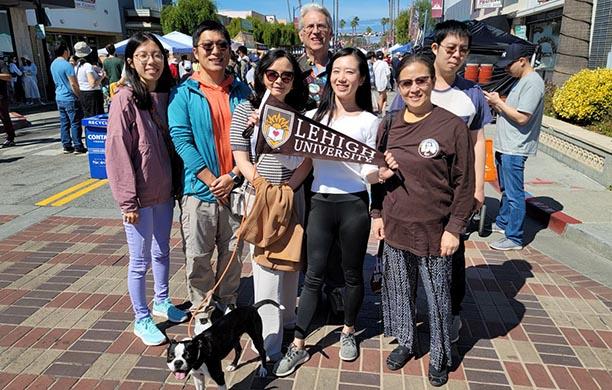Consider the last time you purchased event tickets online from a secondary ticket marketplace. You might have thought you were getting a good deal after comparing prices online, only to see hefty fees added on the final checkout screen. The culprit: a service fee based on a percentage of the ticket price plus a delivery fee.
TickPick has disrupted this model. Brett Goldberg ’07 and Chris O'Brien ’07 founded their company with the promise of no fees to ticket buyers and displaying the total cost of purchasing a ticket upfront. They reinforce their claims with a BestPrice guarantee and a BuyerTrust guarantee. This transparency, business savvy, and a lot of hard work educating the consumer base have earned the alumni partners success in the highly competitive online event ticketing marketplace.
The Lehigh Connection
The TickPick story begins at Lehigh. Goldberg chose the university to compete in Division I track and field and study as a finance major, while O’Brien’s interests were in baseball and a computer engineering major. However, a shoulder injury during his freshman year curtailed O’Brien’s athletics experience.
“I still had a great time,” he says. “I made some great friends — lifelong friends — on the team, and I’m glad to have been a part of it.”
For his part, Goldberg appreciated the energy that students put into both academics and their social lives.
“There was some camaraderie around studying in the library for finals, then taking a break to hang out,” he recalls. “Mastering some topics and kind of grinding to understand the academic piece — I felt a big sense of accomplishment.”

Both pledged the Delta Phi fraternity, becoming roommates and close friends and regularly discussing the idea of partnering together in a business venture some day. The seeds of a concept were sown when Goldberg bought and resold tickets to multiple Red Hot Chili Peppers concerts. He wasn’t impressed with the secondary ticket marketplace and figured they could do better.
Launching the Business
After graduation, Goldberg worked in investment banking for Barclays, then joined the Sixpoint Partners boutique investment bank in New York City. O’Brien implemented speech recognition technology for Fortune 500 firms. They met monthly about starting a business together with a growing conviction that online ticket reselling suffered from a lack of innovation and a negative consumer perception.
Raising $250,000 from family and friends, the pair quit their jobs and founded TickPick in 2011. With no staff, both partners spent much of their time answering phones and dealing with support issues. O’Brien also developed the website and pricing algorithm, while Goldberg paid more attention to finance, marketing, and operations. Launched in 2012, Tickpick.com featured a bidding platform inspired by eBay.
“People were interested in the concept, but we got feedback, ‘How do I just buy tickets?’” says O’Brien. “It was clear that promoting a very differentiated product was still an interesting proposition. We decided to focus on pricing. The fee structure is a huge pain point.”
The partners decided not to impose service fees on buyers. TickPick generates revenue by charging sellers a flat fee of 10% for every ticket sold on the platform. In contrast, competitors charge sellers up to 15% per ticket and buyers 10% or much more for high-demand events. Another differentiator, which some others have since adopted, was developing an algorithm that assigned specific baseline values to different seats at the same event.
Overcoming challenges
One hurdle has been people using stolen credit cards to buy tickets and try to resell them on TickPick. “What’s been eye-opening for me is the amount of fraud that exists in the world, and especially in our industry,” says O’Brien. “It’s a constant battle dealing with these folks.”
In the early days, every order over $1,000 was manually reviewed. O’Brien also programmed fraud protection into the system, and later the company employed third parties that analyze consumer behavior and block suspicious transactions.

Another challenge has been winning over customers shopping online for the lowest ticket prices, as competitors appear to have less expensive options because their fees aren’t included on the search results page. At one point, a major competitor tried emulating TickPick’s upfront-pricing approach but abandoned the effort.
How did TickPick make upfront pricing work? Through relentless consumer education.
“It’s one of the foundations of everything we do,” says Goldberg. “The second you land on our site, it’s embedded in our marketing messages. In the early days on Twitter, people started talking about us as the no-fee ticket marketplace. We started using the language that people used to describe us.”
Growing Success
In 2013, TickPick garnered $1 million in sales. Three years later, it ranked #90 on Inc. magazine’s list of the fastest-growing companies in the U.S. TickPick raised $40 million in private equity in 2019 to expand business operations and grow its team. Last year, the company sold over $700 million in tickets, 3.5 times its total in 2019, and its revenue grew at an even faster rate.
TickPick has forged partnerships with brands like Major League Baseball, the Philadelphia Eagles, the Los Angeles Rams, the Los Angeles Kings, LaLiga (Spain’s top men’s soccer league), as well as numerous music festivals and others, securing branding at live events. “There’s huge value in associating TickPick with professional sports,” Goldberg explains.
What’s next?
“Long term, I have full conviction that we’ll be on the same level as our largest competitors,” says Goldberg. “That’s the trajectory we’re trying to fulfill.”


